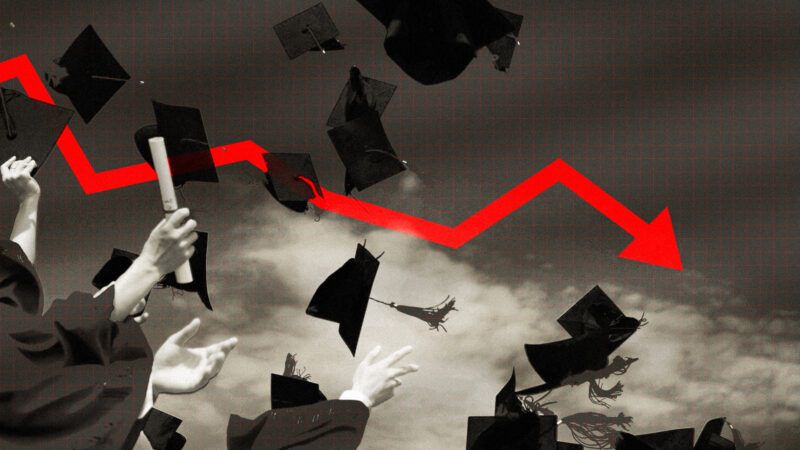Fewer People Are Going To College. That Could Be a Good Thing.
"If I would have gone to college after school, I would be dead broke," one high school graduate told the A.P.

Fewer and fewer young people are enrolling in college after graduating high school. However, while many have presented this decline as tantamount to a national emergency, declining college attendance rates may actually be a good thing. Lower enrollment sends the message that four-year colleges need to lower their inflated prices. Plus, the decline may actually be coming from students who were already likely to drop out of school without a degree. By skipping school, many are saving themselves from accruing unnecessary debt for a degree they likely would never have obtained.
While college enrollment rates for recent high school graduates have been steadily increasing for decades, the proportion of high school grads going on to college began to level out after the start of the Great Recession, fluctuating between 66 percent and 70 percent from 2008 to 2018. However, following the pandemic-era school closures of 2020, enrollment began a rapid decline. From 2019 to 2020, national college enrollment rates for recent high school graduates declined 3.5 percentage points, from 66.2 percent to 62.7 percent, the largest one-year drop in over 30 years. Rather than rebounding in 2021, the rate continued to decline, albeit at a lower rate, hitting 61.8 percent.
According to the Associated Press, college attendance rates have increased slightly in 2022. However, the decline has still resulted in panic from lawmakers and higher education officials. For example, in 2021, officials in Tennessee launched a "call to action" after finding that just over half of Tennessee high school graduates were enrolling in college.
"In the current economic reality, a high school diploma is not enough for long-term success," said one official in a press release last year. "All students can benefit from postsecondary education or training beyond high school to achieve success and provide opportunities for advancement, which is why the college-going rate decline and disparities should be a call to action for Tennessee and our nation."
While it's unclear exactly why more and more high school graduates are skipping college, there are a few theories. One theory is the impact of a gaping post-pandemic labor shortage has caused many employers to offer tantalizingly high pay to high school graduates. For many, this seems to outweigh the draw of college, particularly with average tuition rates being so eye-poppingly high.
That does seem to be a major factor for some students, like Daniel Moody, a 19-year-old who took a job at a Ford Motor Co. plant instead of attending college. "If I would have gone to college after school, I would be dead broke," he told the A.P. "The type of money we're making out here, you're not going to be making that while you're trying to go to college."
But attractive jobs aren't the whole answer. The work force participation rate among 16- to 24-year-olds is actually lower now than it was before the pandemic. While some students are giving up college for attractive jobs, many more seem to be simply doing nothing at all.
But there's no need to panic. Many of these individuals who aren't going to college or in the labor force may very well have ended up right where they are now anyway, having dropped out of school.
In 2020, just 26 percent of high school students taking the ACT, a popular college entrance exam, met all four "College Readiness Benchmarks" set by the ACT. These benchmarks are minimum scores on the test's four subject areas that statistically correlate with success in a freshman-level college course in the same subject. Despite only a quarter of high school students who took the ACT being prepared for college, over 60 percent of recent high school graduates were enrolled in college the following year.
While the two data sets aren't directly comparable, they nevertheless indicate that a large number of students enrolled in college aren't academically capable of succeeding there—and are, therefore, at high risk of dropping out. Between 2019 and 2020, 24.1 percent of full-time, first-time undergraduates dropped out, leaving with thousands of dollars in debt and no degree to show for it.
While data on the pandemic's effects on college dropout rates is sparse, declining college attendance rates may result in declining dropout rates, as those who would otherwise begrudgingly attend college—while being unlikely to succeed there—will skip college entirely, saving possibly thousands of dollars in debt they may have accrued from an aborted college venture.
"There were a lot of us with the pandemic, we kind of had a do-it-yourself kind of attitude of like, 'Oh — I can figure this out,'" one high school graduate told the A.P. "Why do I want to put in all the money to get a piece of paper that really isn't going to help with what I'm doing right now?"
